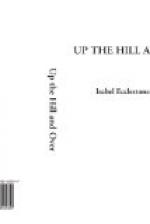“Love!” she said the word caressingly. “Perhaps it is. They say love is a disturbing thing. But—does it usually make a man bang doors?”
“It often turns a sensible man into a fool.” Miss Annabel’s tone held bitterness. “But what I can’t discover is this! If Angus is in love, whom is he in love with?” The question was delivered with such force that Esther jumped.
“I’m sure I don’t know!”
“Nor do I. And that is what I must find out. I have my suspicions. My dear, don’t let me startle you, but have you ever thought that it might possibly be—your mother?”
“Gracious! So it might! I never thought of it.”
“I have not been blind,” went on Miss Annabel complacently. “I have noticed how often he calls at the Elms and how long he stays. Also how very considerate he is of Mrs. Coombe, how patient with Jane, how indulgent with you—”
“Indulgent with me!” indignantly. “Why should he be ‘indulgent’ with me?”
“Why, indeed,” asked Miss Macnair pointedly, “unless on account of your mother?”
Esther subdued a desire to laugh. Many little things, half-observed, seemed to fit in with Miss Annabel’s theory. Yet, somehow, instinct told her that the theory was wrong.
“I don’t believe it,” she declared finally. “At first I thought it possible but now I seem to know that we’re on the wrong track. Mr. Macnair is not in love with mother, and as for mother—Oh, the thing is absurd! Aren’t you awfully hungry, Miss Annabel?”
CHAPTER XVII
It was a curious luncheon party. The host was abstracted, nervous, far from being his usual bland self. The guest was subdued, silent, uneasy for no reason at all. The hostess, usually an ever-springing well of comment and question, had decided upon quiet dignity as the most fitting expression of sensibilities ignored by the banging of doors.
“I think, Angus,” she ventured once, “that you ought to remonstrate with Mr. McCandless in regard to ‘If a man die.’ An Easter Anthem is an Easter Anthem, but after five renderings it is hardly fair to expect the congregation to behave as if they had never heard it before.”
“Quite so,” said the minister absently.
“Then may I tell him myself that it is your special request—”
“Certainly not. I wish you would not interfere, Annabel. The choir does very well. I think I have told you before that your continual desire for something novel in music has not my sympathy. I am not sure that I approve of this growing craze for anthems. They seem to me, sometimes, wholly unconnected with worship. We do not ask for new hymns every Sunday, nor do we ever become weary of the psalms. Indeed, familiarity seems often the measure of our affection.”
“Net with anthems,” firmly. “Anthems are different. Aren’t anthems different, Esther?”
“I have known familiarity to breed something besides affection in the case of anthems,” agreed Esther.




